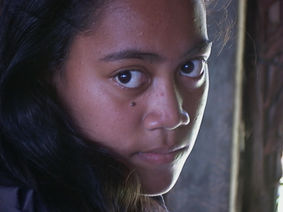The lush tropical beauty of Rotuma, Fiji contrasts with the stifling conformity of island culture as Viki fights for justice and her freedom.
THE LAND
HAS EYES

THE STORY
Shamed by her village for being poor and the daughter of a convicted thief, Viki is inspired and haunted by the Warrior Woman from her island's mythology. The lush tropical beauty of Rotuma, Fiji contrasts with the stifling conformity of island culture as Viki fights for justice and her freedom.
Viki, a beautiful and sensitive young South Pacific girl, listens intently to her father, Hapati, a storyteller. His tale is about seven brothers and their sister on a voyaging canoe. The eldest brother commits an unforgivable act; later on the brothers abandon their sister on a remote island called Rotuma. Struggling to survive, the sister discovers inner strength and survives a difficult birth. Through hard work and determination, she becomes known to later generations of Rotumans as their first inhabitant and their Warrior Woman.
Viki plants a tropical flower garden, which becomes her safe haven when she is teased or misunderstood. On an island that demands hard physical work instead of intellectual and artistic pursuits, Hapati encourages his daughter to develop her scholastic abilities; he also nurtures her questioning, probing nature. In return Viki adores her Father. When Hapati is wrongly accused of stealing coconuts by their wealthy neighbor, Koroa, who has just returned from Australia, Viki despairs. Meanwhile, Koroa schemes to force his neighbor Hapati and his family to move away while he builds the first double-story house on the island. And Koroa doesn’t want his son Noa idolizing the clever girl next door.
Koroa bribes the dishonest court interpreter, Poto, with a pig. Poto lies about Hapati’s answers in a court case before the British judge who cannot understand or speak Rotuman. Since Hapati doesn’t speak English either, he is not aware of the misinterpretation. But Viki has hid under the court window and has overheard the deliberate mistranslation. When she tells her Father what has happened, Hapati repeats to her the ancient Rotuman belief that the land itself is vigilant and will eventually avenge any wrongdoing.
Stressed out and working excessively hard so he can sell enough copra to pay the court fine, Hapati becomes ill and dies. Viki now understands the Warrior Woman’s feeling of abandonment. She, like the mythical first inhabitant of Rotuma, enters into a surreal realm temporarily before coming to terms with the fact she must face her destiny alone. Or maybe not, as her father’s spirit lives on through his story of the Warrior Woman, Viki’s role model and mentor.
DIRECTOR
VILSONI HERENIKO is Rotuma's first and only playwright, award-winning filmmaker and full professor. He is a former Director of the Oceania Center for Arts and Culture at the University of the South Pacific in Fiji as well as the Center for Pacific Islands Studies at the University of Hawai‘i at Mānoa. Currently he is a professor at the School of Cinematic Arts at UH Mānoa where he teaches screenwriting, indigenous aesthetics, sustainability in film, and film production. He has also received a Star of Oceania Award in Media, Arts, and Culture. He has written about a dozen plays, including the hit-comedy The Last Virgin in Paradise (co-written with the late Teresia Teaiwa), The Monster (about Fiji's military coup of 1987), and Moana Rua: The Rising of the Sea (a musical production about climate change that toured four European countries in 2015.) He was also a cultural consultant for Disney’s animated film Moana. His award-winning narrative feature film The Land Has Eyes premiered at the Sundance Film Festival and was Fiji's first and only film it ever nominated for the Academy Awards. It also won several awards, including Best Dramatic Feature at the Toronto ImagineNative Film + Media Arts Festival. His animated short Sina ma Tinirau won five awards, including Best Short at the Berlin Independent Film Festival (2023) and the Los Angeles International Film Festival (2023). Since covid, he has become a master weaver of coconut leaf baskets with his creations exhibited in five curated art exhibitions, with one having been acquired by Hawai's State Foundation for Culture and the Arts for its permanent collection. And in his latest film Woven, he makes his acting debut as a master weaver and indigenous artist.




